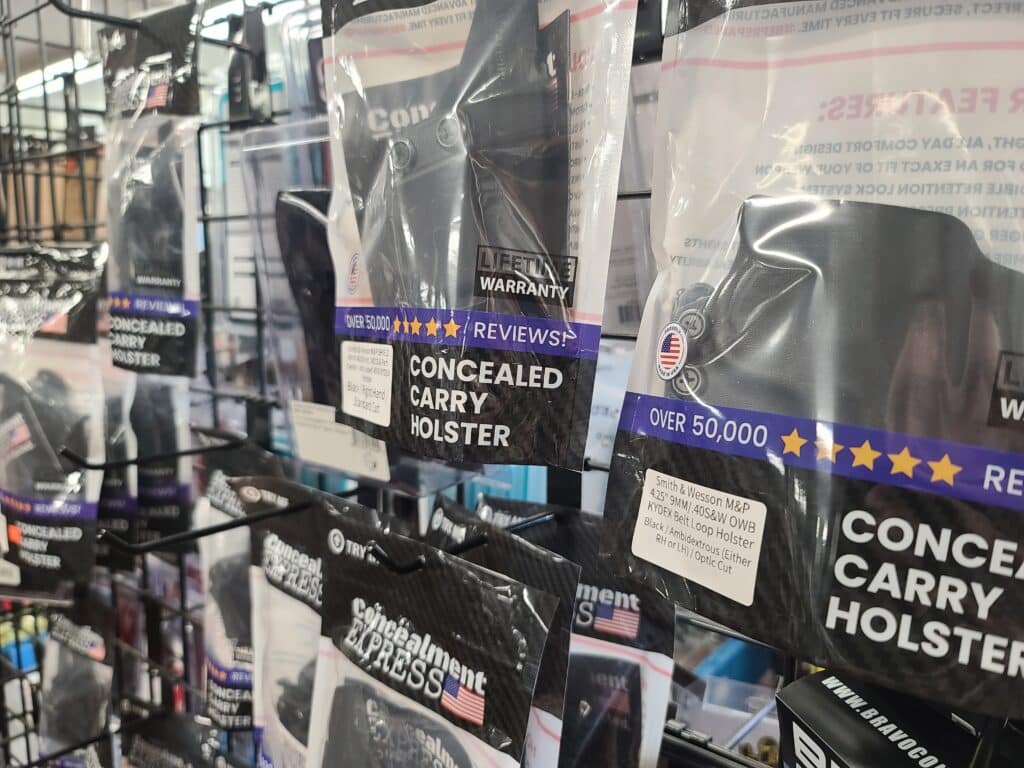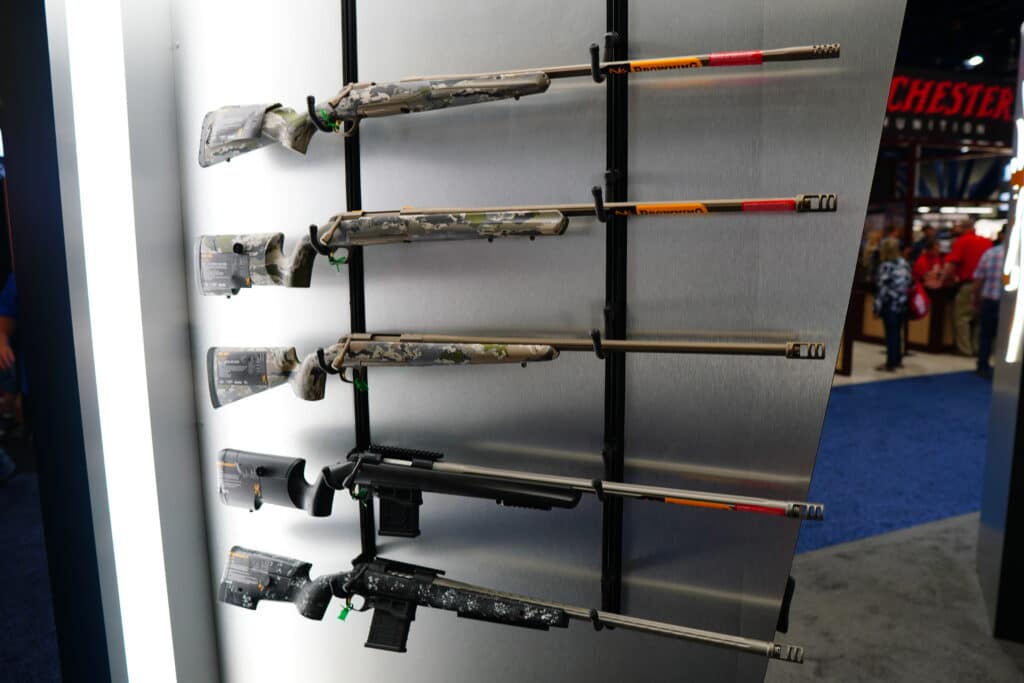After a brief setback, gun-rights advocates are once again on the offensive against New York’s latest gun-carry restrictions. Gun Owners of America has refiled its challenge against the state’s attempt to buck the Supreme Court’s recent ruling against its previous permitting regime. While the case was recently dismissed for lack of standing, it’s now back with new plaintiffs and arguments.
Contributing Writer Jake Fogleman explains why the previous dismissal actually provides reason to think the new filing will succeed–and soon.
Then I take a look at another federal gun case. This one, filed by a criminal defendant rather than a gun-rights group, successfully challenged the ban on those under a felony indictment from receiving guns. But I explain how it also called the convicted felon gun prohibition into question while also providing a potential answer for its constitutionality.
Plus, GMU Professor Robert Leider joins the podcast to explain why the federal felon gun ban may fall.

Analysis: New York’s Gun-Carry Law Is Back on the Legal Chopping Block [Member Exclusive]
By Jake Fogleman
New York’s gun-carry law is back in federal court, and this time its fate might be sealed.
At the end of last month, US District Judge Glenn Suddaby rejected an attempt by gun-rights advocates to block the state’s Concealed Carry Improvement Act (CCIA) from taking effect. He dismissed the suit without prejudice after determining the plaintiffs in the case, Gun Owners of America (GOA) and a New York gun owner, “failed to demonstrate standing.”
The dismissal allowed the new law to take effect starting on the first day of this month. As a result, gun owners hoping to obtain a permit to carry a firearm in public for self-defense must now demonstrate that they possess “good moral character” by disclosing their social media accounts for review, providing four character references, and conducting in-person interviews with law enforcement officials. They must also pass 18 hours of classroom and live fire training through a state-approved training course that has yet to be developed.
Additionally, those who do obtain a permit are now barred from carrying on private property unless the owner posts a sign explicitly allowing it. They’re also barred from carrying anywhere the state has declared a “sensitive location,” defined broadly to include all of Times Square and most public property in the state. The places deemed off-limits to lawful carry are construed so broadly, that when asked by reporters where a law-abiding licensee might be able to carry under the law, New York Governor Kathy Hochul (D.) glibly responded “probably some streets.”
The rushed nature of the provisions in the bill, combined with its felony penalties for those who do not comply, has already wreaked havoc across areas of the state for even the most benign activities. A ceremonial 21-gun salute by New York state officials commemorating the anniversary of the 9/11 terrorist attacks was forced to take place at a consenting gas station this month, rather than at a county court house, due to the law’s no-exceptions ban on gun carry on government property. Musket-wielding Civil War reenactors have been forced to cancel their events out of fear of being arrested.
However, because the previous attempt to have the new law thrown out in court was dismissed without prejudice, the plaintiffs had the option of filing another suit on the same cause of action at a later date. And that is exactly what they did.
GOA refiled its complaint this week and added five additional plaintiffs who are licensed gun carriers and thus directly affected by the law in various ways. At least four of the plaintiffs intend to continue carrying their licensed handguns in newly minted “sensitive locations” in contravention of the CCIA, according to the complaint.
One of the reasons why Judge Suddaby declined to issue an injunction in the first suit and ultimately dismissed the complaint was that the law hadn’t gone into effect at the time of his ruling. As a result, he said GOA could not demonstrate that the plaintiff in the case had suffered any constitutional harm from the law. Now that at least four plaintiffs are on record stating that they are risking a felony charge in order to continue carrying, odds are better a judge recognizes legal harm stemming from the law.
Bolstering the odds of success for the plaintiffs this time around is the fact that the new suit got assigned to a familiar face: Judge Suddaby. Though he did not rule in their favor the first time around, he was pretty explicit in his thoughts on the overall legality of New York’s new gun-carry scheme.
“While pursuing the laudable goal of public safety, and in an attempt to curb ever-increasing mass shootings, the New York State Legislature has generated an unconstitutional statute in the CCIA,” he wrote in his dismissal. “In its eight-day haste to pass a legislative response to the Supreme Court’s Decision in NYSRPA, (which reads less like such a measured response than a wish list of exercise-inhibiting restrictions glued together by a severability clause in case some of the more fanciful restrictions were struck down), the New York State Legislature forgot four important words–‘other than in self-defense.’”
In other words, New York’s CCIA is bound to be struck down. The Judge knows it, the plaintiffs know it, and even the state likely knows it. It’s just a matter of GOA satisfying the court’s standing requirements now. The group filed for a preliminary injunction once again, but they also requested an emergency temporary restraining order against enforcement of the law this time.
As a result, Judge Suddaby has ordered a fast-tracking of the initial briefings and hearing schedule for the case. Though the suit was filed just this week, the oral arguments for the TRO will be heard as soon as next Thursday.
That means, as long as Judge Suddaby is satisfied with the new crop of plaintiffs’ standing in the case, New Yorkers hoping to legally carry a firearm in public could be in for some relief in less than a week’s time.
Podcast: GMU Professor Robert Leider on a Federal Judge Striking Down the Felony Indictment Gun Ban [Member Early Access]
By Stephen Gutowski
We’re focusing on a new federal court ruling calling the federal felony gun ban into question this week.
That’s why we’ve got George Mason University’s Robert Leider on the podcast. He is an assistant professor at the Antonin Scalia Law School who has clerked for Justice Clarence Thomas. He has also written extensively about Second Amendment law.
He said District Court Judge David Counts was correct in his conclusion that the ban on those under felony inducement receiving firearms does not have a historical analogue. He said the same is true for the ban on convicted felons possessing guns. Leider argued the text-and-tradition standard imposed by the Supreme Court’s decision in New York State Rifle and Pistol Association v. Bruen calls both those federal provisions into question alongside a myriad of other gun laws.
Still, he said it’s unlikely the felony prohibition will end up in the dustbin. Leider said Counts’s solution to the issue, which relies on the historical practice of excluding felons from protections for “the people,” may not be the right answer. But he said the federal courts are likely to settle on a justification due in part to the popularity of the restrictions. He argued judicial realism will play a role in how the question plays out even if that’s not what the Supreme Court requires.
Leider also talked about what he views as the biggest threat to legal gun carry: New York’s novel attempt to prohibit carry in public businesses by default. He said the decision to flip the presumption on its head could be difficult to contend with in court. It forces a faceoff between the right to carry and private property rights that has yet to be litigated.
He said it’s not clear how things will turn out and worries the policy could quickly spread to other states. Although, he also lays out a possible Achilles’ Heel in New York’s implementation.
Plus, Contributing Writer Jake Fogleman and I talk about new polls that show how Beto O’Rourke’s gun-control push in Texas is playing out. And Reload Member Bobby Mercer joins the show to talk about how he got into guns as well as what The Liberal Gun Club is and why he joined it.
You can listen to the show on your favorite podcasting app or by clicking here. You can also watch the show on our Youtube channel. Shows come out every Monday. However, Reload Members get access on Sunday AND the opportunity to appear on the show!
Come on the Podcast
One of the many perks of a Reload membership is the opportunity to appear on the podcast for a special segment. If you’re interested in joining me, simply reply to this email. Be like Bobby and join us!

Analysis: Will the Federal Felony Gun Ban Survive Bruen? [Member Exclusive]
By Stephen Gutowski
A federal judge’s ruling opens up new questions on the constitutionality of felony gun bans and tries to answer them.
District Judge David Counts of Western Texas found the Federal Firearms Act’s prohibition on people indicted under felony charges from receiving firearms is unconstitutional. He applied, perhaps reluctantly, the new standard handed down by the Supreme Court in New York State Rifle & Pistol Association v. Bruen. He found the indictment-based ban couldn’t survive that text-and-tradition-based test.
“Although not exhaustive, the Court’s historical survey finds little evidence that § 922(n)—which prohibits those under felony indictment from obtaining a firearm—aligns with this Nation’s historical tradition,” Judge Counts wrote in his opinion. “As a result, this Court holds that § 922(n) is unconstitutional.”
As significant as that finding is, the judge went further. He also cast doubt on the constitutionality of federal felon gun bans overall.
“Whether this Nation has a history of disarming felons is arguably unclear—it certainly isn’t clearly ‘longstanding,’” Counts said.
The government argued in the case that the Supreme Court noted in 2008’s District of Columbia v. Heller, which first recognized the Second Amendment protects an individual right to own guns, that the decision striking down the city’s total ban on handguns should not cast doubt on felon-in-possession bans.
“Like most rights, the Second Amendment right is not unlimited,” Justice Antonin Scalia wrote for the Court in Heller. “It is not a right to keep and carry any weapon whatsoever in any manner whatsoever and for whatever purpose: For example, concealed weapons prohibitions have been upheld under the Amendment or state analogues. The Court’s opinion should not be taken to cast doubt on longstanding prohibitions on the possession of firearms by felons and the mentally ill, or laws forbidding the carrying of firearms in sensitive places such as schools and government buildings, or laws imposing conditions and qualifications on the commercial sale of arms.”
The government said the history of the felony-indictment ban was closely aligned with the convicted-felon ban and is therefore also constitutional. But Judge Counts said the Bruen test requires much more than citing short, non-binding sections of Heller.
“[H]eller’s endorsement of felon-in-possession laws was in dicta. Anything not the ‘court’s determination of a matter of law pivotal to its decision’ is dicta,” he wrote. “Dicta is therefore ‘entitled to little deference because they are essentially ultra vires pronouncements about the law.’ Or, as Francis Bacon put it, dicta is only the ‘vapours and fumes of law.’
Instead, Counts said a historical analysis is required. And the analysis he did found there were no analogous bans on felons owning guns. He noted the states did not even fully disarm those considered to be traitors to the country.
“Indeed, when Virginia disarmed all citizens who refused to take an allegiance test, it did so only partially, allowing citizens to keep ‘such necessary weapons as shall be allowed him by order of the justices of the peace at their court, for the defense of his house and person,’” Counts said. “So even ‘traitors’ unwilling to swear allegiance to the Crown retained their weapons in colonial America.”
He further cited a 2007 law review by Robert H. Churchill, who couldn’t find “a single instance in which these jurisdictions exercised a police power to prohibit gun ownership by members of the body politic” during early American history. He also pointed to a 2009 review by C. Kevin Marshall that found the first record of gun carry being regulated by the state of the carrier (being intoxicated in this case) instead of the manner of carry did not come until 1886.
Still, it seems unlikely the Supreme Court would allow one of the few gun restrictions it explicitly said was presumptively constitutional to fall under its own standard for review. But that’s where Judge Counts has a potential answer. After rejecting the argument made by New York and others, which relies on the existence of bigoted gun bans targeting Catholics and Native Americans, he suggested a potentially more viable alternative.
“[B]ruen and Heller dealt with regulations restricting where someone may keep and bear arms and unlike the challenged regulations in Bruen and Heller, § 922(n) restricts ‘who’ may keep and bear arms,” he said. “Under the Second Amendment, the “who” imbued with the right to keep and bear arms is ‘the people’—a term of art. Thus, the historical inquiry should be whether there is a historical tradition of excluding those under indictment from ‘the people.’”
He argued that other rights reserved to The People have historically been denied to certain subgroups, including felons, because they were considered excluded from The People. And those exclusions, including over who can vote or exercise certain First Amendment rights, weren’t based on bigotry like the ban cited by New York.
“[T]here is a long history of the Government regulating those rights—including restriction on who can exercise that right,” he argued. “Thus, the history of excluding specific groups from rights and powers of ‘the people’ in other constitutional contexts can provide useful analogies.”
Judge Counts concludes there likely is sufficient historical precedent to uphold a ban on gun possession by those convicted of felony charges, as is the case with the right to vote. However, he still thinks the ban for those merely indicted of a felony wouldn’t pass the test because the prohibition would come before due process was served.
The case is one of only a handful to deal with the implications of the Bruen ruling. As judges feel out how best to apply the Court’s text-and-tradition standard to key gun laws, it will be interesting to see what conclusions they reach on the best approach. Counts is the first to suggest the federal felon restriction may be unconstitutional and the first to articulate how it may not be depending on how Bruen should be interpreted.
But even he is unsure how things will play out.
“The Bruen Court made the constitutional standard ‘more explicit’ to eliminate ‘asking judges to ‘make difficult empirical judgments’ about ‘the costs and benefits of firearms restrictions,’” he said. “Bruen did not, however, erase societal and public safety concerns—they still exist—even if Bruen’s new framework prevents courts from making that analysis. As stated above, the new standard creates unknown unknowns, raising many questions. This Court does not know the answers; it must only try to faithfully follow Bruen’s framework.”
That’s it for now.
I’ll talk to you all again soon.
Thanks,
Stephen Gutowski
Founder
The Reload








Only Members can view comments. Become a member today to join the conversation.